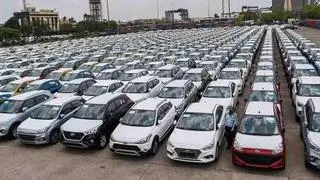The viability of nearly 20,109.85 MW domestic fuel-starved gas-fired power plants now solely depends on State distribution companies’ (discoms) agreeing to pay a higher price for electricity.
This is because generating power from expensive imported gas would push tariffs up by at least Rs 3-4 per kwh.
The Power Ministry, which has tried several measures to help power plants, including price pooling of gas, now seems left with no other option.
“There are no changes in domestic gas supplies. The gas-based power plants are now running at plant load factor of 30-35 per cent. Diversion from other sectors can only keep increasing the availability, but will not help much,” P. Uma Shankar, Secretary at Ministry of Power, told Business Line .
“The most crucial factor is tariff increase,” he said. Uma Shankar is due to retire on June 30.
However, a Power Ministry official said “Increase in tariff is possible only if discoms are willing to buy and are allowed to pass through the higher cost. But, the purchaser is not willing to pay a higher cost.”
At present, gas-fired stations require 72 mscmd of gas to operate at 75 per cent plant load factor. Against this requirement, the actual gas supply to these plants is about 27 mscmd that allows the units to operate at only 29 per cent plant load factor, the Power Ministry said.
When asked if price pooling of gas was a feasible solution, Uma Shankar said, “If you have a larger base of domestic supply, then you can make a pool with imported gas, which can be distributed evenly. Then the price would be lower. There is nothing much that we can do.”
Industry watchers feel that nearly 2,700 MW of stand-alone gas-fired capacities face the prospect of turning into non-performing assets. The remaining capacities are promoted by players that have a broad portfolio of coal-fired and renewables.
The worst hit plants include Tata Power’s Rithala, Torrent Power’s Sugen, GVK Gautami Power, GMR Kakinada, Konaseema Gas Power Ltd and Lanco’s Kondapalli unit.
Salil Garg, Director (corporate) at India Ratings & Research, said in case of some power purchase agreements, if the producer can show availability of natural gas (may be imported) or is able to run the plant on fuels such as naphtha, the buyer will have to pay fixed charges.
Once the power producer gets paid for the fixed charges, it will be able to service its debt and will not turn into a non-performing asset, he said. However, he said every power purchase agreement may vary.








Comments
Comments have to be in English, and in full sentences. They cannot be abusive or personal. Please abide by our community guidelines for posting your comments.
We have migrated to a new commenting platform. If you are already a registered user of TheHindu Businessline and logged in, you may continue to engage with our articles. If you do not have an account please register and login to post comments. Users can access their older comments by logging into their accounts on Vuukle.